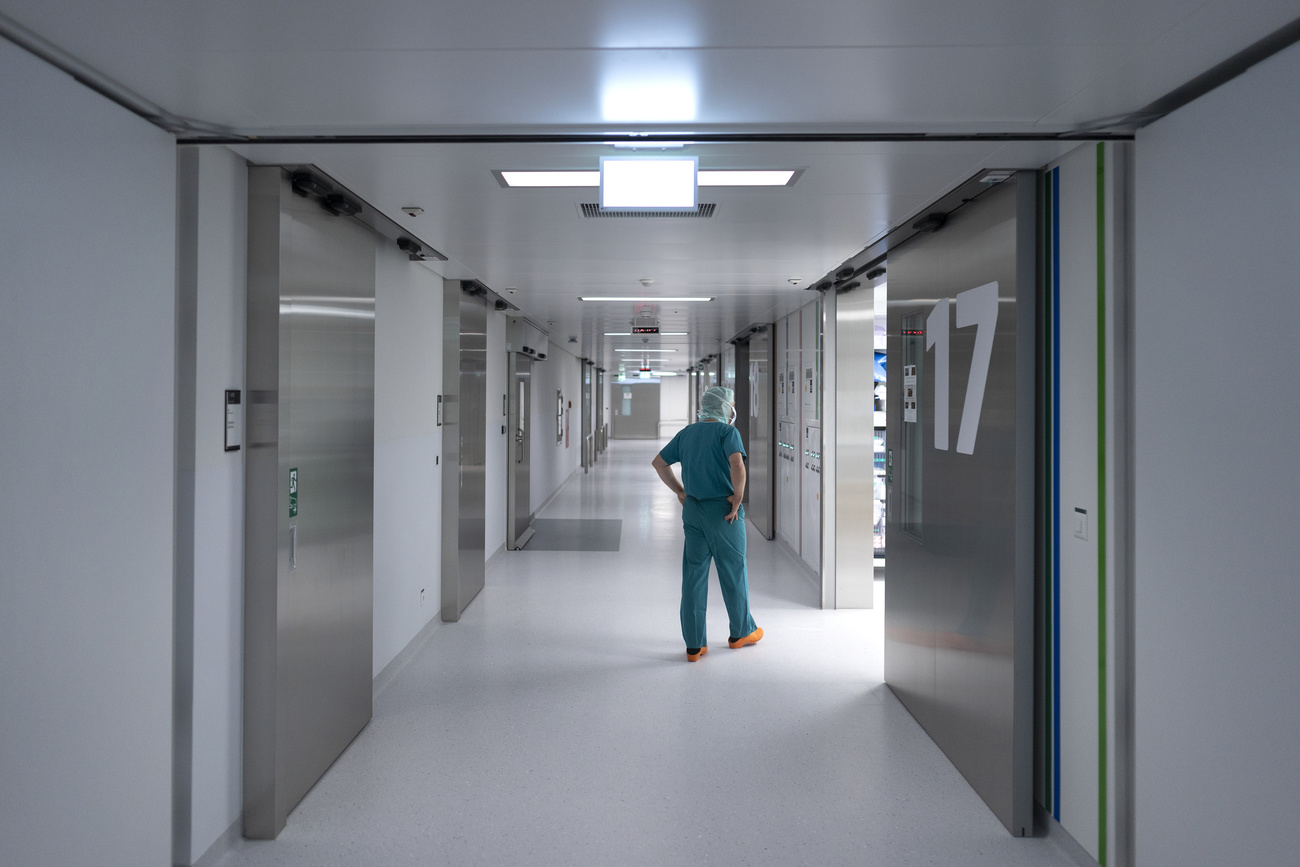Understaffed and overworked: Swiss doctors’ harsh self-diagnosis

A survey of Swiss doctors this week confirmed the trends towards more stress, longer waiting times for patients, and growing concerns about staff shortages.
Switzerland has one of the world’s best – and costliest – healthcare systems. But it too has its limits, especially faced with a growing and ageing population. How do doctors deal with the pressure? The gfs.bern research institute, commissioned by the Swiss Medical Association (FMH), asked 1,700 of themExternal link. Here are some of the main findings.
The country is facing a ‘dramatic’ shortage of doctors
Around two-thirds of doctors surveyed – and 73% in psychiatric fields – say a shortage of qualified staff is a “rather serious” or “very serious” issue, and the figure is rising. After a decade of stability (the survey has been done annually since 2011), the situation since 2020 has seen two trends: on the one hand, doctors say recruitment is becoming more difficult, while on the other hand, they increasingly fear that there are no longer enough staff in hospitals and clinics to guarantee adequate care.
In a press release this week, the FMH said Switzerland currently lacks around 5,000 doctors and some 15,000 nursing staff. And while the education system aims to churn out 1,300 newly qualified doctors each year, medical specialists reckon this isn’t enough, especially given a looming wave of baby boomer retirements; more than a quarter of doctors in Switzerland are now over 60. Earlier this month, FMH director Yvonne Gilli said a “dramatic” situation was shaping up.
Hospitals are heavily reliant on foreign medical staff
But is it another luxury Swiss problem? The situation doesn’t – at least for now – look so bad on paper. In 2021, Switzerland boasted 4.4 doctors per 1,000 inhabitants, placing it towards the upper end of the scale for developed nations, according toExternal link the Organisation for Economic Co-operation and Development. As for nurses, Switzerland has the second-highest density in the world behind Finland, at 18.4 per 1,000 inhabitants.
But to maintain this situation – faced with an ageing population and the impending retirement wave – it relies on immigrants and cross-border workers. Almost four in ten doctors are from abroad, just over half of them from Germany. As well as dependence, this can raise moral questions, Jana Siroka from the FMH told the Neue Zürcher Zeitung newspaper this week: “we can’t plug our holes with workers from abroad forever; such poaching with higher salaries is unethical,” she said.

More
Is there an answer to Switzerland’s spiralling healthcare cost misery?
Doctors are stressed, overworked, and some have itchy feet
Some 83% of doctors in acute care say staff shortages have a negative effect on their physical and psychological health. Almost 70% report colleagues quitting due to stress. And between 11% (for acute care) and 25% (for general practitioners) say they plan to ditch the profession in the next few years; while most of the latter are due to retirements, many of the former are due to the heavy workload and long hours.
And while the poll didn’t ask about exact time spent on the job, anecdotes of epic working days are legion in the sector; a 2020 surveyExternal link showed over half of doctors worked longer than the legal maximum of 50 hours per week. The gfs.bern survey did, however, confirm that administrative work is a growing burden: daily time dedicated to paperwork and other such tasks has increased by 25 minutes over the past decade, to 2.5 hours.
Patients are well-served, but waiting longer
As for patients, they can complain about rising health insurance premiums, but the Swiss healthcare system itself is still one of the best in the world. The doctors surveyed largely confirm this; expertise and medical equipment are top-notch, they say. However, the number concerned about quality is slightly rising, and has considerably grown in the psychiatric field, where the number of doctors who say quality is “good” or “very good” dropped from 78% in 2020 to 57% in 2023.
Waiting times are also getting longer: 74% of acute care doctors confirm this, as do 70% of general practitioners and 84% of psychiatrists. In hospitals especially, waiting times are growing. For acute care and rehabilitation treatment, patients generally get an appointment within a month; an appointment for psychiatric care can take longer. Doctors meanwhile say such waiting can have a knock-on effect on recovery time, but that it’s rare that it prevents recovery.

More
Healthcare costs: is the system broken?
Solutions are hard to come by
The gfs.bern survey did not go into details about what could be done to fix the issues. However, respondents are largely positive about one major reform of the Swiss healthcare system in recent years: the 2019 push to boost outpatient procedures and reduce the inpatient burden. However, respondents are less happy about this reform when it comes to imagining possible impacts on their own specialised field of work.
Elsewhere, the FMH is continuing to push for more investment in training more doctors, both as GPs and specialists. However, this is not a silver bullet, it says. “A reduction of administrative burdens and a better work-life balance are priorities,” FMH vice-president Philippe Eggimann told the Le Temps newspaper this week. Eggimann also called for more societal recognition of the work of doctors, to counter the claim that they are somehow responsible for rising healthcare costs in general.

In compliance with the JTI standards
More: SWI swissinfo.ch certified by the Journalism Trust Initiative









You can find an overview of ongoing debates with our journalists here . Please join us!
If you want to start a conversation about a topic raised in this article or want to report factual errors, email us at english@swissinfo.ch.